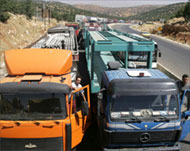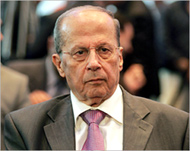Lebanon parliament to vote on cabinet
The new Lebanese government led by Fuad Siniora, the first of the post-Syrian era, is set to win parliamentary approval on Saturday after three days of debate.

The main anti-Damascus alliance that nominated Siniora has an eight-seat majority in the 128-member legislature after parliamentary elections in May and June.
Siniora’s 24-member line-up is the first elected government since Syria ended its three-decade military presence in its smaller neighbour in April in the face of intense international pressure.
His cabinet includes a minister from the Shia Muslim movement Hizb Allah.
Reform programme
Siniora on Thursday presented a series of reforms to parliament, pledging a programme to focus on national reconciliation and democracy.
After the confidence vote, Siniora is to make his first official visit abroad on Sunday to Damascus to try to improve relations that have deteriorated since the troop pullout.
Siniora has called for “healthy, privileged and solid relations” with Lebanon’s former political masters.
Siniora, 62, is a former finance minister and close ally of predecessor Rafiq al-Hariri, killed in a massive bomb blast in Beirut in February, widely blamed on Syria and its allies in Lebanon.
Syria relations
Siniora is due to meet Syrian President Bashar al-Assad and Prime Minister Mohammad Naji Otri during his visit, Lebanese officials said on Saturday.
 |
|
There have been border issues |
“I want to come back (from the trip) with a new way of dealing between Lebanon and Syria, a new thinking, that we should co-operate and create an attitude of openness between the two countries,” he said in an interview with the Financial Times published on Thursday.
“The attitude has to be based on mutual interest and respect.”
Since the elections, the two sides have been locked in a row, with Lebanese trucks being blocked at the border in a major blow to trade, and large numbers of Syrian workers have left Lebanon, depriving their country of desperately needed remittances.
Militia spat
Meanwhile, a spat over the fate of former Lebanese militiamen living in Israel is threatening to reopen old wounds in Lebanon, with Christian leaders demanding they receive an official amnesty and Muslim leaders insisting “collaborators” be punished.
 |
|
Many of the militamen fled to |
Fearing reprisals or heavy punishment if they stayed in Lebanon, some 6000 members of Israel’s now-defunct proxy militia, the South Lebanon Army (SLA), had fled to the Jewish state with withdrawing Israeli troops in 2000.
Though over half have returned in recent years, many remain in Israel.
Parliament passed an amnesty bill this month that freed Christian warlord Samir Geagea and hundreds of Sunni Muslims suspected of links to a failed Islamist uprising in 2000.
Amnesty
Christian deputies in the new parliament now want to extend a similar amnesty to those Lebanese who worked with Israeli troops during their 22-year occupation of southern Lebanon.
But the proposal has received a frosty reception among many, especially Shia Muslim Hizb Allah whose guerrilla campaign was instrumental in ending the Israeli occupation.
 |
|
Aoun has called for an amnesty |
Christian opposition leader Michel Aoun told parliament on Thursday that it was time for those who fled to the Jewish state to come home, so that Lebanon could turn the page on its troubled past.
“Why can’t we bring back the thousands of Lebanese refugees in Israel? This issue can only be ended through a parliamentary, judicial inquiry,” Aoun said, adding that many had little choice but to work with the Israelis during the occupation.
“The people of Jezzine and the border strip paid the price and are now considered collaborators.”
Traitors or victims?
Some Lebanese who joined the SLA fought against their own country and ran a notorious jail. But others did clerical, menial or agricultural jobs for the Israelis during the occupation, when the Lebanese state had virtually no presence in the south.
Many of those who stayed or returned have received relatively light sentences – sometimes under a year for rank and file militiamen deemed collaborators by Lebanese courts.
Reprisals have been rare, but Lebanese who resisted the Israelis do not want those they consider traitors to go unpunished. Hizb Allah chief Shaikh Hassan Nasrallah rejected on Friday any plan to pardon Lebanese who worked with Israel.
“This is a major insult to the sacrifices of the Lebanese people and the struggle of the resistance, and an assault on the families of the martyrs, the wounded and the detainees who suffered and continue to suffer from the crimes committed by the enemy,” Nasrallah told the left-leaning As-Safir newspaper.
“It is odd at a time when the security situation in Lebanon is shaky to hear calls for the return of thousands of collaborators who served the enemy … We believe the proposed amnesty is a clear threat to Lebanese national security.”